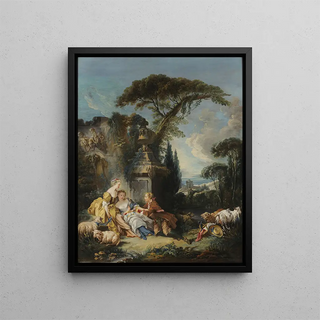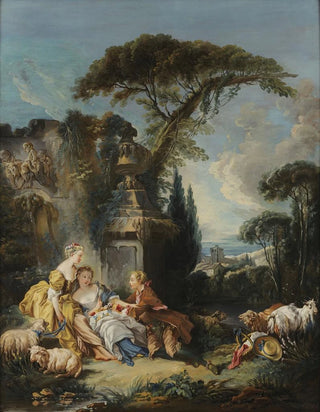Art print | Pastoral scene (Conflict of case) - François Boucher


View from behind

Frame (optional)
In the enchanting world of rococo art, "Pastoral Scene (Conflict of Cases)" by François Boucher stands out for its irresistible charm and delicacy. This iconic artwork, which evokes simple pleasures and harmony with nature, transports us to a world where love and beauty meet in the heart of idyllic landscapes. The composition, rich in colors and details, invites attentive contemplation, gradually revealing the subtleties of pastoral life. Through this art print, Boucher's spirit is preserved, allowing admirers to immerse themselves in the refined aesthetics of the 18th century.
Style and uniqueness of the work
François Boucher's style is immediately recognizable, characterized by curved lines, voluptuous forms, and a palette of soft, luminous colors. "Pastoral Scene (Conflict of Cases)" is no exception to this rule. The composition is a true ballet of human figures and lush landscapes, where the lightness of draped fabrics and the fluidity of the characters' poses demonstrate undeniable technical mastery. The expressions of the protagonists, both playful and tender, capture the very essence of human relationships, blending intimacy and conviviality. The meticulous details, such as vibrant flowers and peaceful animals, add a sensory dimension to the work, making the visual experience even more immersive.
The artist and his influence
François Boucher, born in 1703, is one of the undisputed masters of French rococo. His prolific career saw him navigate between historical painting, portraiture, and genre scenes, but he excels particularly in the depiction of pastoral life. His influence extends well beyond his era, inspiring many contemporary and subsequent artists who sought to capture the lightness and beauty of nature. Boucher mastered the fusion of Italian and French influences, creating a unique style that redefined painting of his time. Through "Pastoral Scene (Conflict of Cases)", he succeeds in conveying an idealized vision of rural life.

Matte finish

View from behind

Frame (optional)
In the enchanting world of rococo art, "Pastoral Scene (Conflict of Cases)" by François Boucher stands out for its irresistible charm and delicacy. This iconic artwork, which evokes simple pleasures and harmony with nature, transports us to a world where love and beauty meet in the heart of idyllic landscapes. The composition, rich in colors and details, invites attentive contemplation, gradually revealing the subtleties of pastoral life. Through this art print, Boucher's spirit is preserved, allowing admirers to immerse themselves in the refined aesthetics of the 18th century.
Style and uniqueness of the work
François Boucher's style is immediately recognizable, characterized by curved lines, voluptuous forms, and a palette of soft, luminous colors. "Pastoral Scene (Conflict of Cases)" is no exception to this rule. The composition is a true ballet of human figures and lush landscapes, where the lightness of draped fabrics and the fluidity of the characters' poses demonstrate undeniable technical mastery. The expressions of the protagonists, both playful and tender, capture the very essence of human relationships, blending intimacy and conviviality. The meticulous details, such as vibrant flowers and peaceful animals, add a sensory dimension to the work, making the visual experience even more immersive.
The artist and his influence
François Boucher, born in 1703, is one of the undisputed masters of French rococo. His prolific career saw him navigate between historical painting, portraiture, and genre scenes, but he excels particularly in the depiction of pastoral life. His influence extends well beyond his era, inspiring many contemporary and subsequent artists who sought to capture the lightness and beauty of nature. Boucher mastered the fusion of Italian and French influences, creating a unique style that redefined painting of his time. Through "Pastoral Scene (Conflict of Cases)", he succeeds in conveying an idealized vision of rural life.






